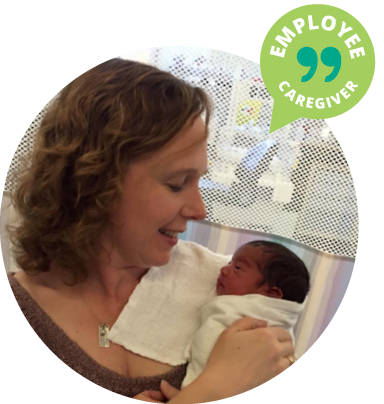Karen Cuthbertson,
caring for children and aging parents
I’m what I like to call a “serial caregiver.” To varying degrees, I’ve been caregiving my whole life, from being an intensive caregiver for kids for the past nine years to the additional role of caregiving for my aging parents.
When my caregiving role required a much larger part of attention, I was in the midst of working in my consulting role, which can be very demanding. The most difficult part is balancing the expectations I set for myself because those expectations can fall through due to the unpredictable nature of caregiving. You can never really anticipate when disaster will hit, and when it does, it is very overwhelming. At times, I wasn’t able to make meetings and I missed deadlines for clients. As a consultant, this is the worst thing that you can do.
On the other hand, the job has also allowed me to look for contracts that are suitable for my caregiving role. My workplace is very flexible in terms of planning around my caregiving responsibilities, as long as the work is being delivered. I was initially burning out trying to find hours in the night where I could get my work done, but I quickly came to the realization that it was unsustainable.
I think the biggest support an employer can provide caregivers is flexibility for when the work gets done, along with offering them the opportunity to take time away to manage changes in their personal life. The other thing is just having a supportive approach by the way they ask how you’re doing and actively listening, and then connecting you with resources such as caregiver organizations.

“I think the biggest support an employer can provide caregivers is flexibility for when the work gets done, along with offering them the opportunity to take time away to manage changes in their personal life.”

“I think the biggest support an employer can provide caregivers is flexibility for when the work gets done, along with offering them the opportunity to take time away to manage changes in their personal life.”
Karen Cuthbertson,
caring for children and aging parents
I’m what I like to call a “serial caregiver.” To varying degrees, I’ve been caregiving my whole life, from being an intensive caregiver for kids for the past nine years to the additional role of caregiving for my aging parents.
When my caregiving role required a much larger part of attention, I was in the midst of working in my consulting role, which can be very demanding. The most difficult part is balancing the expectations I set for myself because those expectations can fall through due to the unpredictable nature of caregiving. You can never really anticipate when disaster will hit, and when it does, it is very overwhelming. At times, I wasn’t able to make meetings and I missed deadlines for clients. As a consultant, this is the worst thing that you can do.
On the other hand, the job has also allowed me to look for contracts that are suitable for my caregiving role. My workplace is very flexible in terms of planning around my caregiving responsibilities, as long as the work is being delivered. I was initially burning out trying to find hours in the night where I could get my work done, but I quickly came to the realization that it was unsustainable.
I think the biggest support an employer can provide caregivers is flexibility for when the work gets done, along with offering them the opportunity to take time away to manage changes in their personal life. The other thing is just having a supportive approach by the way they ask how you’re doing and actively listening, and then connecting you with resources such as caregiver organizations.

